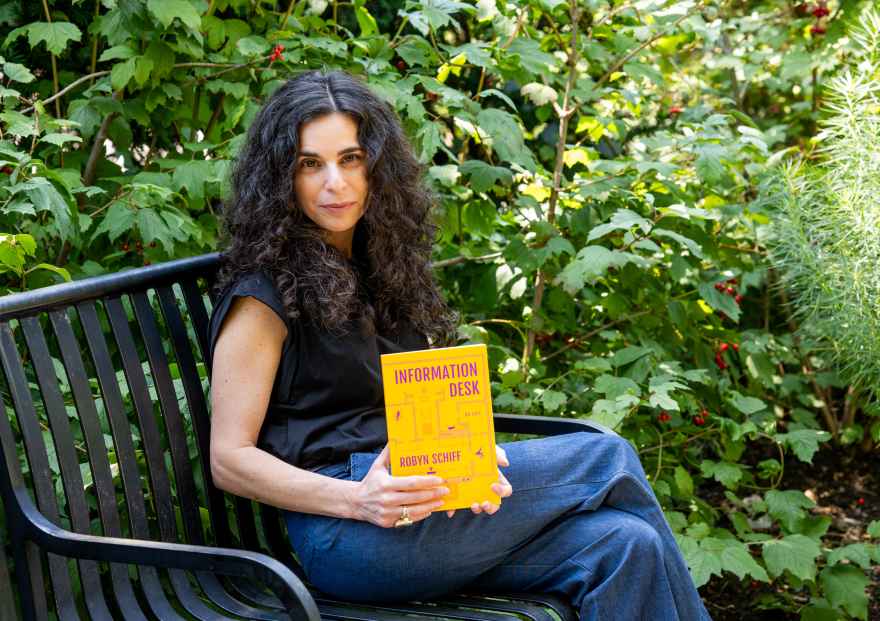Robyn Schiff's epic poem 'Information Desk' draws critical acclaim

The following was published in UChicago News on August 27, 2024.
By Sara Patterson
When Prof. Robyn Schiff sat at the information desk at the Metropolitan Museum of Art in New York, she felt as if, “I was living my life at the center of the world.” Nearly 30 years later, Schiff transformed her experiences into an epic poem, expertly weaving its collections of visual art and connections to the world into her life’s journey, material world and imagination.
For Information Desk: An Epic (2023), Schiff recently received the 2024 Four Quartets Prize from the Poetry Society of America. The international Prize celebrates multipart poems, with the winner receiving $20,000. Previous recipients of the Four Quartets Prize include Courtney Faye Taylor, John Murillo and Dante Micheaux.
“Entering the Metropolitan Museum of Art daily as a young writer I was overwhelmed by its contradictions. The beauty of the artwork is very often in conflict with the violence of its collection. The history of art is at once breathtaking and ruthlessness to behold,” said Schiff, professor in the Department of English Language and Literature and director of the Program in Creative Writing at UChicago. “Being present in that building, confronting that artwork, and time traveling through the corridors of the museum, one gets the sense that everything is on fire; every single work is an emergency.
“Yet somehow, despite navigating that vast space, which is almost too big and spans 5,000 years of history, the Met manages to create intimacy work by work, moment by moment. This too is the job of Information Desk; I strove to express scale and distance even as I considered my own life at close range against the emotionally charged artworks, I was daily in contact with.”
Through the halls of the Met
Already a poet and reader of poetry, Schiff worked at the Met’s information desk off and on for five years after her graduation from Sarah Lawrence College in 1995. She gained experience and knowledge through observing the people and artwork but needed time to mature, hone her writing style and develop the imaginative presence and patience to write Information Desk.
Schiff describes her epic poem’s compositional structure as simultaneously formal and improvisational as it winds in and out of the museum through history, literature, material and memory. She considers the tangible aspects of the artwork and the lives of artists, staff and visitors, as well as the insect life thriving around and in art objects.
From Information Desk, p. 14:
…There was a cart
we used to transport brochures
from a storage closet
to the Desk. You had to steer it
back through the Renaissance
into a passage that
opened in a dark medieval hallway…
“To chase Robyn through the halls of the Met through the prism of memory and through scales world historical and microscopic in Information Desk is utterly exhilarating,” said Anne Eakin Moss, associate professor and chair in the Department of Slavic Languages and Literatures at UChicago. “When I heard her read from the book last spring, she made it seem that its unrelenting intensity and erudition sprang fully formed from her mind.”
Honing her craft
Information Desk is Schiff’s fourth book of poetry. It was a finalist for the 2024 Pulitzer Prize and the 2023 National Book Critics Circle Award. Her previous collection of poems, A Woman of Property (2016), focused on urgent, imperiled domesticity and was a finalist for the Los Angeles Times Book Prize and named a best book of the year by the New Yorker and the Chicago Tribune. Her other collections of poems Revolver (2008) and Worth (2002) set the stage for the development of her interest in history, visual art as a literary device and formal structure and prepared her for the undertaking the writing of Information Desk, according to Schiff.
“With machine-like precision, Schiff’s poems travel somewhere near the speed of sound, progressing relentlessly toward often terrifying ends, while calling into question the very mechanisms of progress itself,” said Srikanth “Chicu” Reddy, professor in the Department of English Language and Literature and the Creative Writing Program at UChicago and poetry editor for The Paris Review. “Taken together, her poems disclose a deeply disquieting portrait of the darkness at the heart of all civilizing projects.”
Both a writer and her own critic, Schiff describes the process of drafting her poems as revising, diminishing and refining her words. She works and reworks a poem backwards, and often erases what she has written, finalizing the poem’s material world, imaginative journey through space and its progress and retreat through time.
In addition to honing her own work, Schiff has been teaching UChicago students about writing since she started here in 2023. Overall, she finds extraordinary energy and commitment to the arts here, and is moved by collaborative artistic opportunities for herself and her students.
“The potential relationship between creative writing and the other arts is profound at UChicago,” Schiff said. “When young writers are exposed to dance, theater, music, film, and visual art they develop a stronger, more fluid and collaborative understanding of expression.”
Currently, Schiff is finishing an article for Art Forum and thinking more about visual art and writing reviews. Her graze is not turning toward poetry presently, but moving toward something else that she cannot recognize yet.